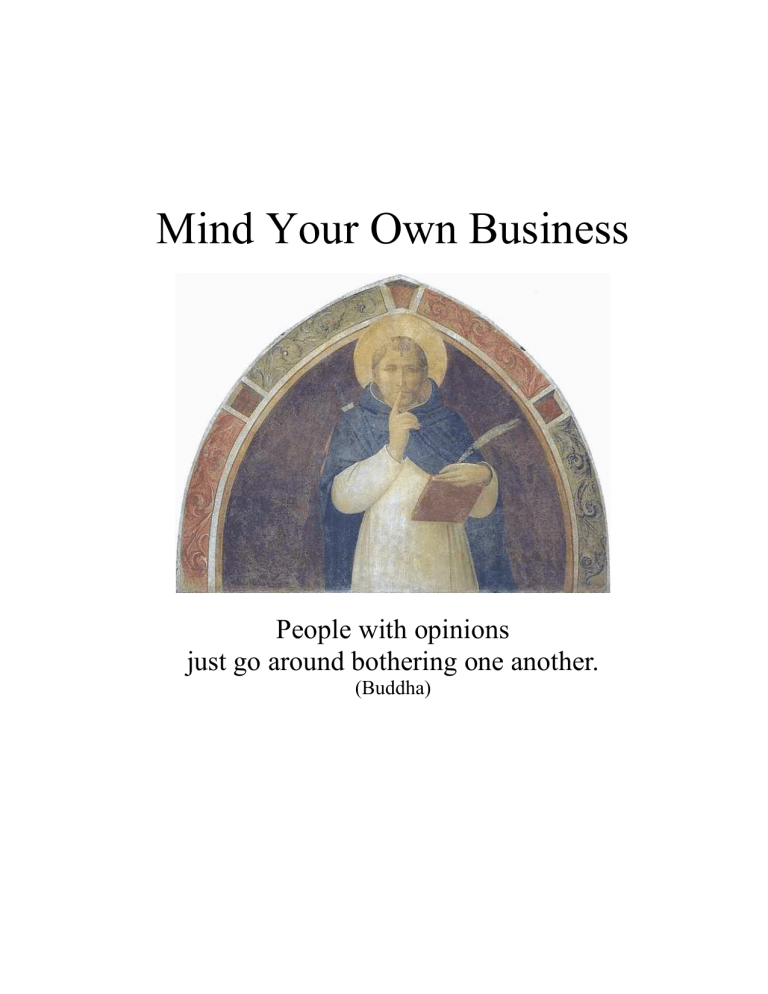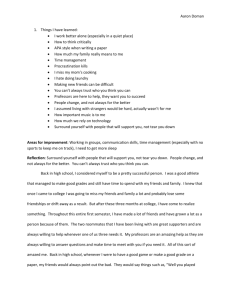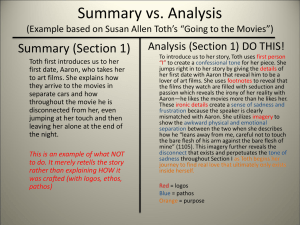Mind Your Own Business - Spiritual Quotations for Lovers of God

Mind Your Own Business
People with opinions just go around bothering one another.
(Buddha)
-1-
To mind your own business incorporates the whole duty of man.
(Brigham Young)
"Mind your own business" is a common English saying which asks for a respect of other people's privacy. It can mean that a person should stop meddling in what does not concern that person. It suggests that one should attend to one’s own affairs instead of the affairs of others.
A few modern theologians believe that the phrase "Mind your own business" is a biblical derivation. Saint Paul mentions to the church of
Thessnolika about this manner of living in his instructions as a way of
Christian life.
(wikipedia.org/wiki/Mind_your_own_business)
Make it your goal to live quietly, to mind your own business, and to work with your own hands, as we instructed you, so that you may win the respect of outsiders, and have need of nothing.
(Saint Paul, The New Testament, 1 Thessalonians 4:11, 12)
One should not pry into the faults of others, what they’ve done and left undone. Consider instead what you yourself have done and left undone.
(Buddha)
Let not the disciplined one find fault in others.
When he has to go about, let him never abuse anyone.
(Buddha)
-2-
Do not examine the limitations of others.
Examine how you can change your own.
(Buddhist, Dakini Teachings 1)
And why do you behold the mote that is in your brother's eye, and do not consider the beam in your own eye?
(Jesus Christ)
Be not angry that you cannot make others as you wish them to be, since you cannot make yourself as you wish to be.
(Thomas à Kempis)
Do not condemn the judgment of another because it differs from your own. You may both be wrong.
(Dandemis)
I do not act, people change by themselves.
I like to remain quiet.
(Lao-Tzu)
-3-
Speak as little as possible of oneself. Mind one's own business.
Avoid curiosity. Do not want to manage other people's affairs.
(Mother Teresa)
Worrying about the faults of others is an unnecessary addition to the worry we have over our own faults.
(Hazrat Inayat Khan)
It is great wisdom to know how to be silent and to look at neither the remarks, nor the deeds, nor the lives of others.
(Saint John of the Cross)
As far as possible one should not interfere in the affairs of others.
(Ramana Maharshi)
-4-
Just remember, there's a right way and a wrong way to do everything and the wrong way is to keep trying to make everybody else do it the right way.
(M*A*S*H, Colonel Potter)
How much time a man gains who does not look to see what his neighbor says, or does, or thinks, but only what he does himself.
(Marcus Aurelius)
God, grant me the serenity to accept the people I cannot change, the courage to change the one I can, and the wisdom to know it's me.
(Author unknown)
See everything; overlook a great deal; correct a little.
(Pope John XXIII)
It is great wisdom to know how to be silent and to look at neither the remarks, nor the deeds, nor the lives of others.
(Saint John of the Cross)
-5-
Respect the other person’s point of view, whether or not you agree with it. Recognize that if you had their history, their circumstances, and the forces that play on them, you would likely have their point of view.
(Werner Erhard)
The devotee’s aim is the restraint of his organs of sense and mind;
Silence is his talk, and he has not time to think of any other thing aside from meditation on his Guru’s instructions.
(Dnyaneshwar)
Once I knew a man whose ears were exceedingly keen, but he was dumb. He had lost his tongue in a battle.
I know now what battle that man fought before the great silence came.
(Kahlil Gibran)
It was said of Abbot Agatho that for three years he carried a stone in his mouth until he learned to be silent.
(Thomas Merton)
-6-
The wise man does not argue; he remains silent and goes quietly on his path.
(White Eagle)
The sage does not talk, the talented ones talk, and the stupid ones argue.
(King Tingan)
Calm silence, sincerity, and courteous words, whether one is agreeing or disagreeing with others, mark the person who knows how to behave.
(Yogananda)
-7-
Do not advise too much: do the job yourself. This is the only advice you can give to others. Do it and others will follow.
(Jawaharlal Nehru)
Give not advice without being asked, and when desired, do it briefly.
(George Washington)
To offer a man unsolicited advice is to presume that he doesn’t know what to do or that he can’t do it on his own.
(John Gray)
Unasked advice is a trespass on sacred privacy
(Henry Haskins)
Meher Baba
No one wants advice, only corroboration.
(John Steinbeck)
-8-
Sant Kirpal Singh
Another common desire which you must sternly repress is the wish to meddle in another man's business, directly or indirectly, privately or openly. If you see a case of cruelty to a child or an animal, it is your duty to interfere. If you are placed in charge of another in order to teach him, it may become your duty gently to tell him of his faults. Except for such cases, mind your own business and learn the value of silence.
(ruhanisatsangusa.org/gemsq.htm)
Think twice before you speak. Think twice! What should you think?
One: Is it necessary to say anything? Two: How will it affect others?
Is it in their interest or will it hurt them? Is it good? Is it necessary to say something? If not, keep quiet. Mind your own business.
And what effect will they carry, your words?
These are the two things. Do you remember to do that?
(http://www.ruhanisatsangusa.org/little.htm)
…too much discussion with others is not helpful.
Mind your own business and let other dear ones seek their own redemption.
(Letters to N.Y. area initiates, part 13).
In this vast creation, everyone is gifted with an individual perception.
The heredity, the environment and the teachings inculcated, all combine to make one what he is. We cannot blame anyone for thinking differently in his own way. Everyone has his own temperament and his own way of thinking. They must differ and they do differ vehemently. There is no help for it. It is, on the other hand, the sign of sentient life. We must not therefore, on that account, cross swords with them.
(The Way of the Saints, 257)
-9-
Once you have been put on the Way: Mind your own business! I am using strong words: mind your own business. Have good wishes for all - that is all right - but be concerned with your own progress.
That is why I write to everybody, "For spiritual things, you are directly connected with me." No one should stand between the initiate and the Master so far as spiritual things are concerned. We try to help others at our own sacrifice. So reach the goal, and then if you are given that job, go on, do it. Some people begin to help others - it is a good thing - but the result is that their progress is retarded and they become bankrupt. So mind your own business. When you see a man is going ahead, all right, you also go ahead! The One who has been given charge of initiation, it is His job to help everybody. Once you reach the goal you may be given that job, if you are considered fit, but not otherwise. Do you follow my point?
(http://www.ruhanisatsangusa.org/mindyour.htm)
Further: we criticize others. We should criticize ourselves as we criticize others. Mind your own business. If you have a friend whom you love, tell him privately, "please don't do it." What more can you do? Unless a man in his heart of hearts feels that he has done wrong, he won't follow you. Man will go by the dictates of his mind. If he is convinced that what he is doing is really wrong, then he will listen to you, otherwise not. So— Wanted: Reformers—Not of others, but of themselves.
Reform your own self: you will reform many men around you. People judge by what they see, not by the words you express or preach. So example is better than precept.
(http://www.ruhanisatsangusa.org/little.htm)
-10-
QUESTION: Master, thoughts are potent; when we feel or think we feel them coming from someone else, whether positive or negative, how to differentiate whether they're our own or whether they're someone else's? Is there a difference, and what to do?
THE MASTER: How to save yourself from the effect of others' thoughts coming to you—this is the problem you mean? Very easy.
There is water flowing, and a wave of that water strikes the shore.
Where there is only mud or sand, the water will thrust into it. If there is a rock, that will strike it and go back with double force. You follow?
If you have no ill will for anybody else, if any evil thought comes from someone else, then it will go back. That's the only way. You remain in your closet, you see. Love is first. You are spiritual, I'd say.
You are spiritual, are you not? Then why be smeared with all this filth?
QUESTION: I've experienced that with someone who is not initiated and is not on the spiritual path, that these bad thoughts have gone back and that person has suffered for it. I see that more and more things go wrong with her as she does this. I've tried to send prayers. Sometimes
I 'm strong enough to pray for her and sometimes I'm not. What to do when thoughts come?
THE MASTER: Mind your own business.
QUESTION: I try to but she doesn't let me.
THE MASTER: Pray for her at the most if you like, all right; but mind your own business. Don't be the contractor for all the world over, you see. You're responsible for your own actions…
(http://www.ruhanisatsangusa.org/ondiary.htm)
-11-
The following is an excerpt from a question and answer session where again Master emphasizes the need to place our attention on our own spiritual development and not let the mind be distracted with unnecessary preoccupations.
Disciple: I was thinking about people that live in places where it's impossible to get vegetarian food, like Eskimos.
Master: I have not followed.
Disciple: Suppose you take Eskimos.
Master: What Eskimos? Are you paid for them?
Disciple: I was just wondering about the karma, that they can't in wintertime get vegetarian food?
Master:…When you go there, you may mind your own business. I think you are not a--what do you say--advocate to plead for all the world over. Plead for your own self. What Eskimos eat, do, or what others do, let them do. If you set your own house right, that's all right.
If you reform yourself, the whole world is reformed. We work like unpaid apprentices of the C.I.D. of God. Mind your own business.
You'll develop. Everything will be done. An example is better than a precept. We know so many things, we don't do. We are only asking,
"Why this?" and "Why that?" A tree is growing, "Why is it not bearing fruit?" Well, when they grow--for what reason--you cannot know. Man cannot know everything. God makes the arrangement.
Whatever is your sphere of life, you have to just make the best use of that and go up. That's the ultimate goal. The main principle lying behind is to be harmless, that's all.
(http://www.ruhanisatsangusa.org/lok/privacy.htm)
-12-
Question: Master, in one of the mimeographed releases through the years, it was said that Guru Nanak prophesied there would be fourteen
Gurus of the Sikhs and then seventy lesser Gurus after that.
Master: What have you to do with it? Mind your own business. The same thing comes up: "When is Christ returning?" It is God's Will.
He cannot leave His children, who are seeking, alone. There is food for the hungry and water for the thirsty.
(http://www.ruhanisatsangusa.org/nonew.htm)
Irene and Master Kirpal Singh, 1972
-13-
7 Tips for Minding My Own Business
(Gretchen Rubin in The Happiness Project)
Lately, I’ve really been focusing on trying to be less judgmental. It’s a tricky resolution, because it’s hard to turn it into specific, manageable resolutions to keep me on track. What, exactly, do I do differently in my life to be less judgmental? I need to change the way I think.
One of my helpful mantras, though, is to “Mind my own business.” I remind myself:
1. No one asked for my advice. Except in the rare instance when people specifically ask me for help clearing their clutter, raising their children, or deciding their careers, I should keep my advice to myself.
2. I don’t know the whole story. It’s very easy to assume that I understand a situation and to form a judgment when in fact, I understand almost nothing about what’s happening.
3. It doesn’t affect me. A friend was all worked up about some stupid thing a celebrity did – she was really, truly annoyed. I wanted to say, “You don’t know this person, you’ve never even seen her in person. Why let yourself get so upset about something that has no possible affect on you?” And I remind myself of the same thing.
4. Just because something makes me happy doesn’t mean that it will make someone else happy, and vice versa. I often fight the impulse to be a happiness bully, but what works for me might not work for someone else. I remind myself of the negative example of Thoreau: I almost can’t bear to read Thoreau’s
Walden, because he’s so disdainful of other people’s tastes and values. When he writes about his own experience and views, I find his work very compelling, but he’s very judgmental and dismissive of any different vision of a happy life.
5. Don’t gossip.
-14-
6. I’m on someone else’s turf. I’m puzzled by my mother-in-law’s habit of keeping her toaster unplugged. Why -- why keep the toaster unplugged?
Whenever I want to challenge her to defend her unplugged-toaster position, I remind myself, “This is her apartment and her rule. Unplug the toaster.” (I have to confess, I usually forget to unplug it. But I mean to unplug it.)
7. Find explanations in charity. One of my favorite writers, Flannery O’Connor, wrote in a letter to a friend: “From 15 to 18 is an age at which one is very sensitive to the sins of others, as I know from recollections of myself. At that age you don’t look for what is hidden. It is a sign of maturity not to be scandalized and to try to find explanations in charity.”
(http://www.psychologytoday.com/blog/the-happiness-project/201106/7-tips-minding-my-own-business)
-15-
It's None of Your Business:
How to Keep Friends and Not Influence People
(from Psychology Today by Mark Matousek)
Though gossip is inevitable, it also gives us a false sense of power. While evolution has prepared us to dish about others, it has not provided us with the power to change them in any way whatsoever, no matter how brilliant our input may be.
This paradox can be excruciating. How is it possible for an ordinary, controlling individual to care intensely about his friends without trying to change them?
How can we give our treasured advice without feeling attached to its implementation? How can we witness friends making the same terrible decisions again and again —and again —without feeling the need to castigate them? Shouldn't influence be part of the friendship contract, a modicum of sayso to help us guide the people we love to lead happier, more worthwhile lives?
The answer is: Absolutely not. We're not meant to have any control whatsoever over the behavior of our friends. That is because their behavior is none of our business. Our opinions about the lives of others are void of inherent importance or meaning. This is the price of loving individuals born with a measure of free will: Control is never, ever, an option. We can no more dictate friends' actions than they call the shots for us. This is the slipperiest slope on the friendship mountain, the most demanding incline of all: How to be hands off and hands on at the same time? Committed but not attached; attentive but not invasive; present yet guaranteedly distant. This distance is extremely important.
Friendship requires distance and closeness, just like any intimacy does, which is why knowing when to keep our mouths shut is such a virtue. Skillful detachment proves to our friends that we love them for who they are rather than the person they'd be if only they were perfect (and listened to us).
Meg didn't know what to do about Aaron. None of us knew what to do about
Aaron. A mutual friend for 25 years, Aaron counted both Meg and me as two of his shortest-list friends for life, and both of us were at our wits end (Meg even more so). The issue was sex, which Aaron was having to great excess and Meg believed should not be discussed, and certainly not on the Internet. With this
50th birthday approaching fast, our once-dignified friend had grown increasingly vocal about his increasingly frequent hook ups with women a whole lot younger than he was, crowing about his too-numerous conquests like
Casanova on too much Cialis. Aaron had taken in the previous year to
-16- celebrating the prime of his life in an online column called "The New 50," enumerating his questionable liaisons with for all the Web-world to see. Both of us were concerned for him. Actually, we were mortified.
"What are we going to do?" Meg asked me, frantic with puritanical horror.
"No idea."
"Somebody's got to stop him!" she shrieked.
"How?"
"He's making a goddamn fool of himself." As Meg said this, I felt a pain in my conscience. Twenty years before, when Aaron and I were in our 20s, we had entered into a solemn vow to warn one another if either of us was being ageinappropriate, or embarrassing himself in public. This promise had been made at a café in Paris. At the table next to ours, a lecherous codger was putting the moves on a pretty co ed, his Engelbert Humperdink disco shirt unbuttoned below his hairy paunch. We observed this with a shared mixture of pity, contempt, and self-appraisal ("there but for fortune go we") as Engelbert poked his mojo at the disgusted ingénue, who finally threw a ten-franc note at the table and stormed off. That's when Aaron turned to me with a serious look on his handsome face (it was true that he had aged almost too well).
"Never ever let me do that," he said. "Mutton dressed as lamb," I said. "I would rather be dead."
We vowed to save one another from ourselves. That's what friends were for, we agreed, but no intervention had ever been called for until now. Meg insisted that
I was the one to do it since I was Aaron's best male friend. Still, the prospect made me uncomfortable. "The sooner the better," she said gravely.
I promised to do my best. Though Meg had a point, and I was worried, too, something about this didn't feel right. It seemed disrespectful, like trespassing.
Part of the reason that Aaron and I had been best friends for 30 years is that we didn't bust each other's chops or do each other's inventory. We have always been temperamentally opposite, causing me to habitually suspend my judgment.
What's more, addressing Aaron's adolescent-like sex life would force me to touch on deeper, more disturbing issues within his own checkered history, especially his inability to commit. No single woman had the ideal combination,
Aaron would complain. He was scared, he said, of being bored. Hearing this, I would roll my eyes and tell him that was Peter Pan talking. I'd suggest that perhaps it was time to land. Aaron was pigging out at the salad bar but never
-17- getting a good square meal. He knew this, of course, but didn't seem to mind.
He'd accepted his romantic limitations and decided long ago that it was other people's problem, not his, if they couldn't handle it. Was Aaron's promiscuity a smoke screen for loneliness? Yes. Was his life a case study in arrested emotional development? Of course. But was it my job to make him ashamed of himself? I doubted it. The words of a wise teacher came to mind. "There are only three kinds of business in the world," she told her students. "My business.
Your business. And God's business."
When she said this, I knew that the teacher was right, which led to a great epiphany. Suddenly, decades of blurred relationship boundaries turned crystal clear, years of confusion over entanglements, projections, and taking things personally that weren't. As a nosey, controlling, insecure person, this came as a great liberation from the vain belief that I was responsible for other people's choices. In a flash, I was free not to pretend to be able to change a soul; I was also freed from trying to know God's business and make everything work out the way it should. My business. Your business. And God's business. It was very hard to argue with that.
Since then, I'd been using this motto whenever the urge to meddle seized me.
What my friends did was not my business. So what should I do about Aaron, exactly? I knew what I wanted to say to him. The issue, to me, was privacy. He could sleep with all the ladies he wanted but why make it a media event? Why publish things that he might regret - information that others were finding distasteful - in the virtual human mall where information lives forever? Could a little restraint or decorum hurt? That is what I would say to him.
We met the following week for a pow wow. Aaron was in fine form. The night before, he'd hooked up with a woman he met in the line at Duane Reade.
"Ultra foxy. Twenty-nine. She told me I looked like Tony Bennett."
"You don't look anything like Tony Bennett."
"I know! She'd been drinking. My bad!"
To make Aaron's mid-life worse, he was now abusing teen Twitter lingo. "She told me that I rocked the house. "
"The house is old," I couldn't help saying.
-18-
He ordered a Red Bull on the rocks. "I never understood sex before. That's what's ironic. You know what I mean?" I shook my head. "It took me 50 years to figure it out. Women love me. They say I'm a catch. I used to think I was nothing special. Now, I know I'm filet mignon! Maybe I'll make that my next column “From Chopped Liver to Filet Mignon.” What do you think? Too much?
I don't want people to think I'm conceited."
"I wondered about that. The conceited part. Maybe" –I chose my words carefully, "A little discretion might not hurt." Aaron arched an eyebrow at me.
"I mean, it's not really anyone's business-"
"You really need to loosen up," said Aaron. "I've been meaning to tell you–"
"Tell me what?"
"Life doesn't have to be so goddamn serious."
"I love my life."
"I love mine, too," he insisted. "This is the best time I've had in years. I feel free! I don't give a shit what people think. Remember what a prig I used to be?"
I nodded. "I look in the mirror now and think, Watch out world! Big boy's in town. I know what people are saying about me—"
"You do?"
"They think that I should act my age. They think that I'm an embarrassment. I should toe the line, button it up, play the dignified middle-aged man. Well, guess what? They can keep it. If people don't like what I'm doing, screw them.
I mean that in all sincerity. I spent my whole life judging other people. I thought I knew what was right for them without having a clue what was right for myself. If I'd paid more attention to how I felt, it might not have taken me 50 years to start enjoying myself."
And just like that, the engine of righteousness sputtered out in me. I fell off my high horse. Aaron was right - dead right - while Meg and I, and our hand wringing circle of friends - were perfectly wrong. My business. Your business.
God's business. The rest was moralistic presumption. The rest was more about us than him. My job as a friend was to cheer him on; if I couldn't do that, I should shut up and mind my own business. But what about our long-ago
-19- promise to watch each other's back? Did Aaron even remember our vow not to morph into lechers at this late date, to protect our pride and our reputations? I may ask him about this one of these days, if the satyr phase of his life ever passes. As for Meg, she's still beside herself, outraged by Aaron's change of image, outraged that he is not behaving as she believes a 50-year-old ought to behave, and scared of what lies ahead for him if he doesn't button up and shut up.
I wish she'd keep her eye on the ball and figure out why she has stopped dating, herself. I wish she'd find out why she isn't happy and finally do something about that. Luckily, though, it's not my business. Unless she asks.
(http://www.psychologytoday.com/blog/ethical-wisdom/201110/its-none-your-business-howkeep-friends-and-not-influence-people)
May your soul be happy; journey joyfully.
(Rumi)
Kirpalct@yahoo.com
For more booklets go to: kirpalsingh.org
(Spiritual Quotations for Lovers of God)




